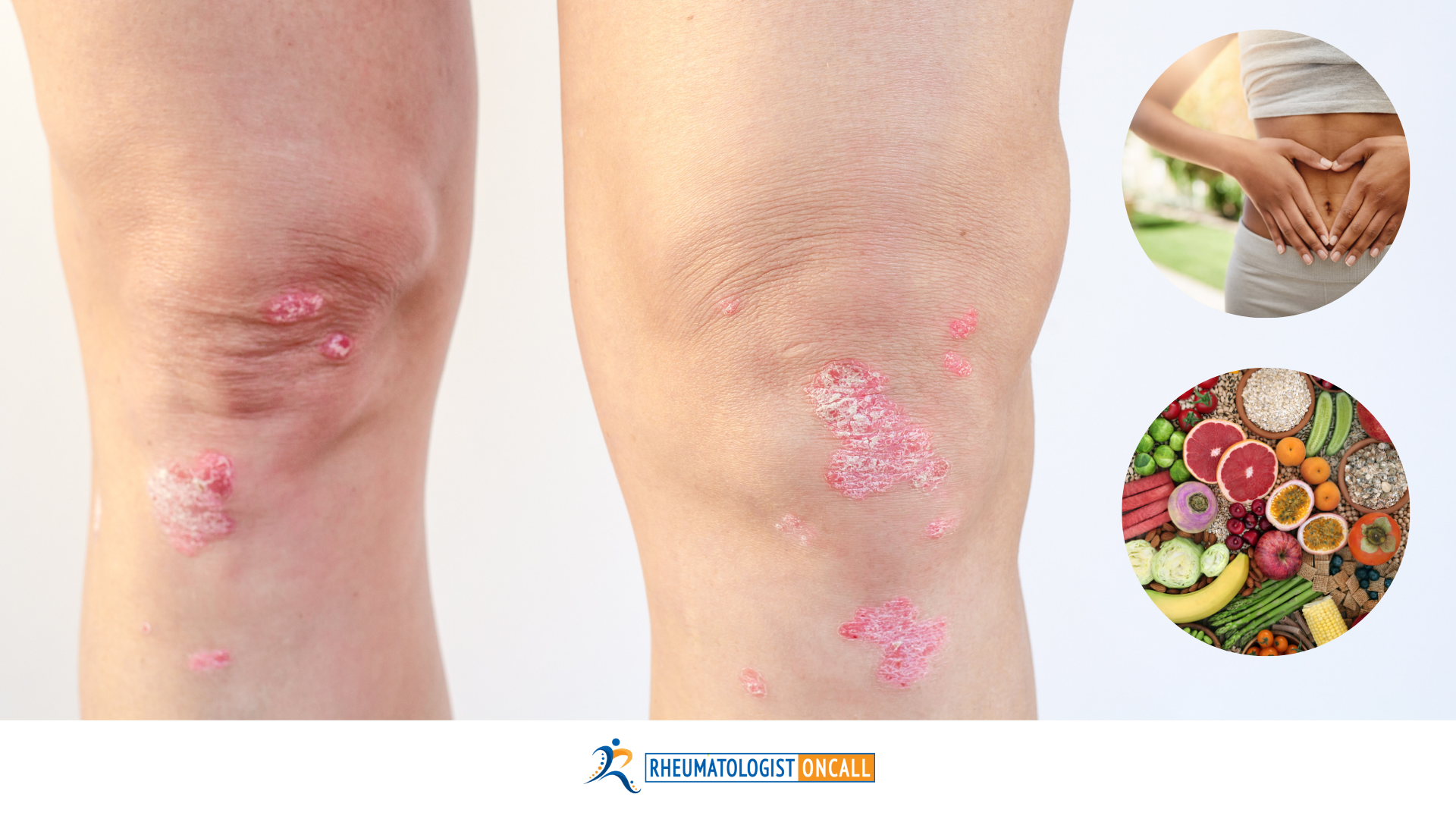SHARE
Are you struggling with Psoriatic Arthritis or Psoriasis and wondering how your diet impacts your condition? In this article, I’ll share valuable information about gut health, foods to avoid, and healthier food alternatives that can help you manage your symptoms better with less pain, inflammation, and stiffness. If you’re ready to feel better with psoriasis and arthritis, continue to read!
Gut Health and Immune System Connection

Our gut is more than just a digestive organ; its role is more than just digesting and absorbing the food that we eat! In the last 10-15 years, research has discovered that our gut is intricately connected to various vital functions in our body, including hormone secretion, mood regulation, and immune system interaction.
The gut microbiome, consisting of millions of bacteria, is key to this connection. It acts as a factory, managing critical body functions and interacting with our immune system. Did you know that 70% of your immune system resides just beyond the wall of your intestine? This close relationship between your gut microbiota and immune cells is crucial for maintaining a healthy immune response.
Impact of Modern Lifestyle on Gut Health
However, modern lifestyle factors such as poor diet, medication overuse, and increased use of chemicals have led to a disruption in this delicate balance, known as dysbiosis. This imbalance can result in various health issues, including inflammatory diseases like psoriasis and Psoriatic Arthritis.
But there’s hope! Studies have shown that following a specific diet can lead to positive changes in gut microbes, reducing pain and inflammation in patients.
Foods to Avoid for Psoriatic Arthritis and Psoriasis
Processed and Fried Foods
Processed and fried foods are high in unhealthy fats, trans fats, and refined carbohydrates, which can increase inflammation and worsen your symptoms of PsA. Instead, try replacing these foods with baked or grilled alternatives, such as baked chicken or grilled fish.
Too Much Sugar
Sugary drinks like soda, energy, or sports drinks are high in refined sugar and can trigger high levels of inflammation in the body. Instead, try replacing these drinks with water or homemade herbal tea.
Red Meat
When it comes to red meat, eating it 1-2 times per week might be acceptable, but consuming it daily is not an option. Instead, try replacing red meat with leaner protein sources like fish, chicken, and turkey.
Dairy Products
Some dairy products, like processed cheese and cheese spreads, might be responsible for more inflammation. Instead, try replacing dairy products with alternatives like almond, coconut, or soy milk. Plain yogurt or kefir can also be beneficial as they are natural probiotics.
Gluten
Some people with PsA or psoriasis may be sensitive to gluten, which can trigger inflammation in the body. Instead, try replacing gluten-containing grains with gluten-free alternatives like quinoa, brown rice, and gluten-free oats.
Nightshade Vegetables
Nightshade vegetables like tomatoes, potatoes, and eggplant contain solanine, which can increase inflammation in some people with psoriasis and Psoriatic arthritis. Instead, replace nightshade vegetables with non-nightshade vegetables like broccoli, cauliflower, and sweet potatoes.
Refined Carbohydrates
Refined carbohydrates like white bread, pasta, and rice can increase inflammation. Instead, try replacing refined carbohydrates with whole grain alternatives like whole wheat bread, brown rice, and quinoa.
Alcohol
Alcohol, especially in large quantities, can increase inflammation in the body and may worsen symptoms of PsA or psoriasis. Instead, try replacing alcohol with non-alcoholic alternatives like sparkling water with a splash of juice or herbal tea.
Foods to Incorporate for Gut Health
Incorporating probiotic-rich foods like yogurt, kefir, sauerkraut, and kimchi can promote a healthy gut microbiome, supporting your immune system and overall health. Additionally, foods high in fiber (like legumes, leafy green vegetables, whole grains) play a crucial role in gut health.
Conclusion
Making changes to your diet might be difficult, but small dietary changes can have a big impact on your health and well-being. I hope these tips on avoiding inflammatory foods and making healthier choices will help you manage Psoriasis and Psoriatic Arthritis more effectively.
FAQs
1. What are the best foods to eat for Psoriatic Arthritis?
Foods high in omega-3 fatty acids, such as fish like salmon and sardines, are beneficial for reducing inflammation. Additionally, foods rich in antioxidants, such as berries and leafy green vegetables, can help manage symptoms.
2. Can diet alone cure Psoriatic Arthritis?
While diet can play a significant role in managing symptoms, it is not a cure for Psoriatic Arthritis. It is essential to work with a healthcare provider to develop a comprehensive treatment plan.
3. Are there any supplements that can help with Psoriatic Arthritis?
Some supplements, such as fish oil and turmeric, may help reduce inflammation and manage symptoms. However, it is important to consult with a healthcare provider before starting any new supplement regimen.
4. Is there a specific diet that is recommended for Psoriatic Arthritis?
There is no one-size-fits-all diet for Psoriatic Arthritis. However, many healthcare providers recommend following an anti-inflammatory diet rich in fruits, vegetables, whole grains, and lean proteins.
5. Can stress worsen symptoms of Psoriatic Arthritis?
Yes, stress can exacerbate symptoms of Psoriatic Arthritis. It is essential to practice stress-management techniques, such as meditation, yoga, or deep breathing exercises, to help manage symptoms.














